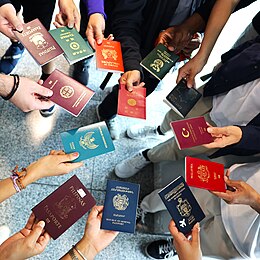The Unseen Borders: A Journey Through the World of Visas (Part 1)

By: Sultan Usman
Travel is often sold as the ultimate freedom—a chance to explore new cultures, discover opportunities, and bridge divides. But for many, crossing borders is not just about packing a bag and booking a flight; it is a game of privilege, politics, and paperwork. The world is not truly open; it is carved by invisible barriers—some built on security concerns, others on economic strategy, and many on unspoken biases.
Why does a German passport unlock 190 destinations visa-free, while a Nigerian passport struggles to access just 40? Why does a UK visa holder still face suspicion in certain countries, while a Singaporean passport glides through immigration like a VIP invitation? In the global lottery of mobility, some people are given golden tickets, while others must fight for every step.
Visa policies are more than just travel rules; they are reflections of history, diplomacy, and global power structures. Some nations extend a warm welcome, others raise walls of bureaucracy. Sometimes, it is about national security. Other times, it is about economic gatekeeping. And often, it is simply politics—who is friends with whom at any given moment.
As technology advances, visa policies evolve. The rise of e-visas, biometric scanning, and AI-driven border control promises seamless travel—but for whom? While some nations boast of digital nomad visas and frictionless entry, others are still stuck in the endless loop of embassy interviews, silent rejections, and frustrating processing delays. Why does an African entrepreneur with UK residency and a solid travel history still face uncertainty at the border, while a first-time Western traveler breezes through immigration without a second glance?
This article takes a deep dive into the world of visas—exposing the policies that shape global movement, sharing real-life experiences of those caught in the system, and analyzing the shifting trends that will define the future of travel. From the political forces behind passport rankings to the overlooked struggles of visa-free travel, we will explore the silent factors that determine who gets to move freely and who remains stuck behind the border.
As the African proverb says, “Not all doors are locked, but not every visitor has the right key.” The question is, who holds the master key to global travel, and how can those locked out find a way in?
They say, “A traveler’s eyes see what the homebound cannot.” But what happens when the traveler is stopped at the gate, not because he lacks a destination, but because he carries the wrong passport?
For some, crossing borders is as effortless as a bird soaring across the sky—no barriers, no questions, no resistance. For others, it is an uphill battle, where embassies act as gatekeepers and visa denials arrive like unexpected thunderstorms in harmattan. A man with dreams of seeing the world may find himself trapped, not because he lacks ambition, but because his passport is treated like a beggar knocking on a rich man’s door.
Meanwhile, in another part of the world, someone else walks through that same door without even knocking. No queues, no interviews, no “come back in two weeks.” Some passports open doors effortlessly, while others require endless negotiation—only to be turned away. The world may be round, but access to it is anything but equal.
Why does this disparity exist? What determines which passports hold power and which are restricted? And, more importantly, how does this affect the everyday Nigerian who simply wants to study, trade, or seek greener pastures abroad?
As the Yoruba saying goes, “A river that forgets its source will dry up.” Understanding visa policies is not just about travel—it is about power, privilege, and the politics of movement. By the time we are done, you will no longer see the world as a map of destinations, but as a complex web of access and restriction, where your passport can either be a master key or a locked gate.
The Illusion of Freedom: The Hidden Realities of Visa-Free Travel
Visa-free travel often appears to be the ultimate advantage—a seamless gateway to the world, free from the burdens of embassy interviews, tedious paperwork, and the looming fear of rejection. For some, it symbolizes trust, strong diplomatic relationships, and economic stability. But for others, it is a harsh reminder of global inequality, where some passports function as keys to the world while others serve as barriers to movement.
At its core, visa-free travel is based on mutual agreements between nations, determined by security considerations, trade alliances, and historical ties. Countries like Japan, Singapore, Germany, and Finland boast some of the world’s most powerful passports, allowing their citizens to enter over 180 destinations visa-free. However, for a Nigerian, Afghan, or Sudanese passport holder, the reality is starkly different. While a citizen of Singapore can book a last-minute flight without a second thought, someone from Nigeria often has to endure embassy queues, excessive documentation requests, and, in some cases, complete silence from immigration authorities.
Despite its privileges, visa-free travel is far from an all-access pass. Many of these agreements come with hidden conditions and unexpected obstacles. For instance, the ECOWAS agreement promises unrestricted movement for West African citizens, yet in practice, Nigerians have frequently reported facing additional scrutiny when entering Ghana, Sierra Leone, or South Africa, despite official policies suggesting otherwise. Similarly, while Nigerians theoretically have visa-free access to certain Caribbean nations like Barbados and Dominica, travelers have recounted cases where immigration officers, suspicious of their nationality, imposed arbitrary denials at the airport.
Another common restriction comes in the form of “blacklists” or selective exclusions. Some countries that provide visa-on-arrival or visa-free access to a long list of nationalities make strategic exceptions for specific countries due to strained diplomatic relations, economic instability, or security concerns. For example:
- The United States Visa Waiver Program covers over 40 countries, allowing their citizens to enter without a visa, yet no African nation is included in the program. Read More
- Countries like Turkey and Indonesia extend visa-on-arrival privileges to most Western nations but exclude certain African and Middle Eastern countries, citing migration risks or diplomatic concerns.
- Ethiopia recently began rejecting Nigerian visa applicants under a “red notice” pretext, despite previously offering an e-visa option. This decision, which lacked transparency, left many travelers stranded and further highlighted the unpredictable nature of visa policies.
For those who enjoy unrestricted access, the benefits are undeniable. Visa-free travel fosters tourism, strengthens international business ties, and promotes cultural exchange. A European entrepreneur can easily explore business opportunities in Dubai, while a Canadian student can seamlessly attend a conference in Germany. The ease of movement provides endless opportunities—but only for those with the right passport.
For those excluded from this privilege, however, the experience is vastly different. Visa application fees are expensive, waiting periods are long, and the fear of rejection is ever-present. Some applicants are forced to book non-refundable flights or accommodation, only to be denied entry at the last moment. The process is not just about travel—it is a test of patience, financial stability, and, in many cases, the unwritten biases of immigration policies.
In the end, visa-free travel is a double-edged sword—an instrument of diplomacy for some and a tool of restriction for others. As the saying goes, “When the gate is open, it is not open for all.” The real question remains: Who decides whose doors remain unlocked, and for how long?
Editor’s Note: This is part of a new weekly series by FactCheckAfrica on explaining the world of visas—exposing the policies that shape global movement, sharing real-life experiences of those caught in the system, and analyzing the shifting trends that will define the future of travel.




